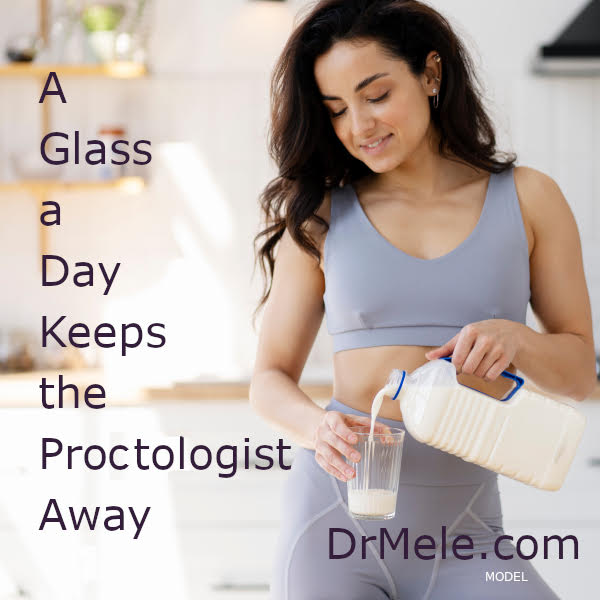Note: If you are dairy intolerant, you can use another source of dietary calcium. Some are listed below in this article.

www.DrMele.com
I normally post the latest plastic surgery news, but an article caught my eye this week, and I wanted to share. I am often asked about how diet affects plastic surgery and healing. In my search to stay informed, I came across a large study from the UK showing the benefits of dairy consumption for lowering the risk of cancer in women.
Cancer Deaths in Women
Lung cancer is the leading cancer death of women in the US. Breast cancer, although more common, is the second, and colorectal cancer is the third. The forth and fifth are pancreatic and ovarian cancer, respectively.
Dairy Consumption and Colorectal Cancer
A large study was published earlier this month in Nature Communications entitled Diet-wide analyses for risk of colorectal cancer: prospective study of 12,251 incident cases among 542,778 women in the UK.
Colorectal Cancer and the Western Diet
We know that the western lifestyle is associated with an increase in colorectal cancer. This is why a screening colonoscopy is recommended beginning at age 45. There has been a reported increase in colorectal cancer in younger people recently. Genetics is known to play a role.
In Japan, however, colorectal cancer is rare, and stomach cancer is common, so upper endoscopy is recommended there. Strangly, after a Japanese citizen moves to the US, their risk of stomach cancer decreases and their risk of colorectal cancer increases to align with the levels seen in US residents. There appears to be an environmental component, and diet is felt to play a part.
Colorectal Cancer and Diet
It is still not clear how exactly diet plays a role in colorectal cancer. To investigate this, the authors of the Nature Communications article looked at 97 dietary factors to see how they influenced the risk of colorectal cancer. They investigated 542,778 Million Women Study participants with 12,251 incident cases over 16.6 years, and conducted a targeted genetic analysis.
Alcohol Consumption Increases the Risk of Colorectal Cancer
Alcohol Consumption is associated with an increased risk of cancer. Consuming 20 grams per day was associated with a relative risk of 1.15 with a 95% confidence level. This means the risk is 1.15 times the risk of the general population.
Interestingly, 20 grams a day is considered one drink in the UK and Australia, and two drinks by the World Health Organization. In the US, one drink is defined as 14 grams or alcohol.
Dairy Decreases the Risk of Colorectal Cancer
The next strongest dietary association was that of calcium intake. 300 milligrams (mg) per day was associated with a reduction in relative risk to 0.83. The range was 0.77–0.89, which means only an 83% change of cancer compared to the general population.
According to the USDA, 300 mg of milk is about one cup. 1% milk has a little more – 305mg. Whole milk has a little less – 276 gm. Breast milk has much less – 79 mg and powdered milk a lot more – 1167 mg.
Other Foods and Colorectal Cancer
The authors also showed an increased risk with red and processed meat intake. A lower risk was seen with breakfast cereal, fruit, whole grains, carbohydrates, fibre, total sugars, folate, and vitamin C. So if you are dairy intolerant, these can be alternative, natural sources of calcium. Genetically predicted milk consumption was inversely associated with risk of colorectal, colon and rectal cancers.
The article concludes that dairy products help protect against colorectal cancer, and that this is driven largely or wholly by calcium. So, if 100 people drink a glass of milk a day, fifteen of them who would have otherwise developed colorectal cancer will remain cancer free. That’s worth sharing. Next week we’ll get back to Plastic Surgery.
Previous Post Next Post